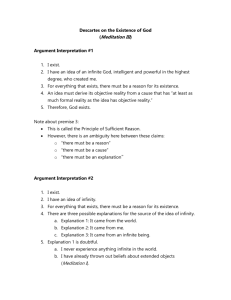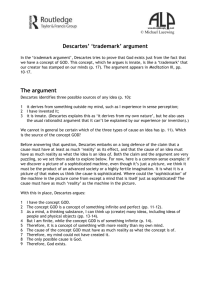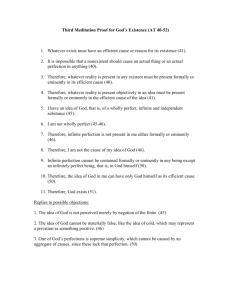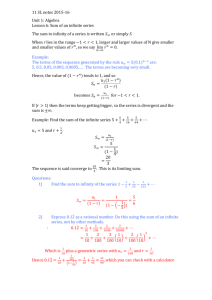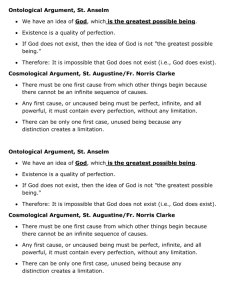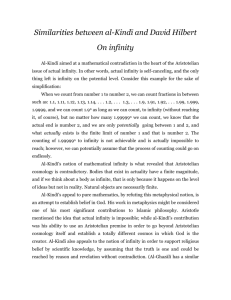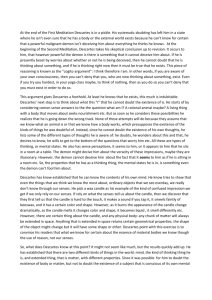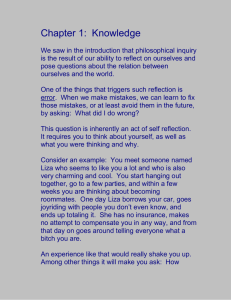Seventeenth Century Philosophy and the Idea of God
advertisement
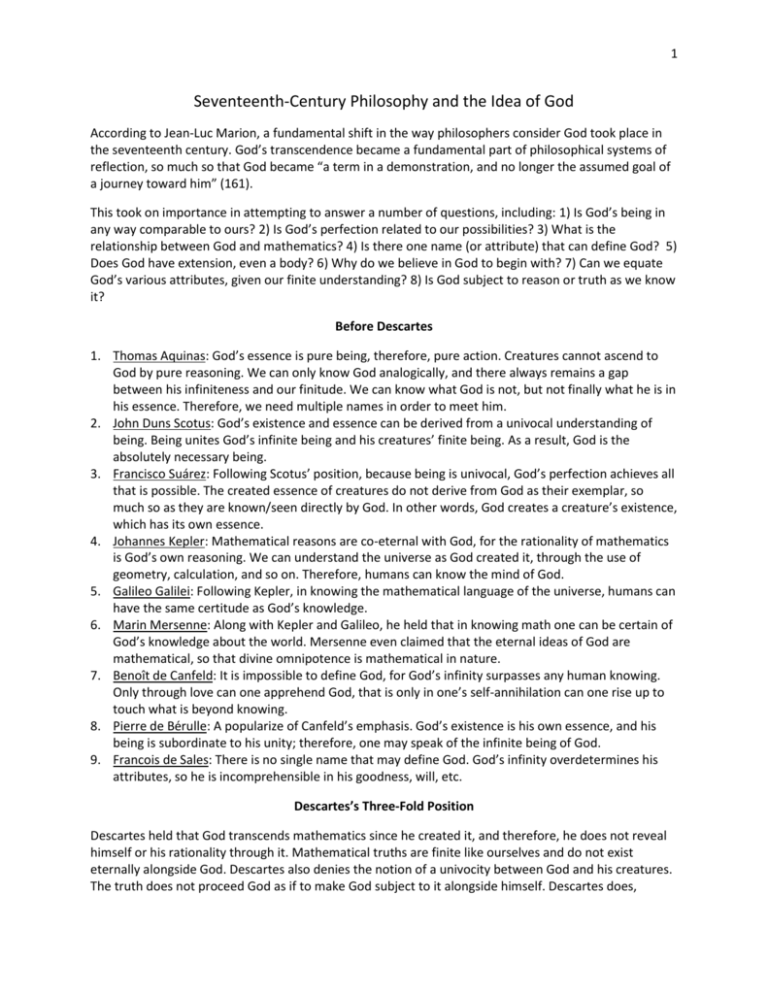
1 Seventeenth-Century Philosophy and the Idea of God According to Jean-Luc Marion, a fundamental shift in the way philosophers consider God took place in the seventeenth century. God’s transcendence became a fundamental part of philosophical systems of reflection, so much so that God became “a term in a demonstration, and no longer the assumed goal of a journey toward him” (161). This took on importance in attempting to answer a number of questions, including: 1) Is God’s being in any way comparable to ours? 2) Is God’s perfection related to our possibilities? 3) What is the relationship between God and mathematics? 4) Is there one name (or attribute) that can define God? 5) Does God have extension, even a body? 6) Why do we believe in God to begin with? 7) Can we equate God’s various attributes, given our finite understanding? 8) Is God subject to reason or truth as we know it? Before Descartes 1. Thomas Aquinas: God’s essence is pure being, therefore, pure action. Creatures cannot ascend to God by pure reasoning. We can only know God analogically, and there always remains a gap between his infiniteness and our finitude. We can know what God is not, but not finally what he is in his essence. Therefore, we need multiple names in order to meet him. 2. John Duns Scotus: God’s existence and essence can be derived from a univocal understanding of being. Being unites God’s infinite being and his creatures’ finite being. As a result, God is the absolutely necessary being. 3. Francisco Suárez: Following Scotus’ position, because being is univocal, God’s perfection achieves all that is possible. The created essence of creatures do not derive from God as their exemplar, so much so as they are known/seen directly by God. In other words, God creates a creature’s existence, which has its own essence. 4. Johannes Kepler: Mathematical reasons are co-eternal with God, for the rationality of mathematics is God’s own reasoning. We can understand the universe as God created it, through the use of geometry, calculation, and so on. Therefore, humans can know the mind of God. 5. Galileo Galilei: Following Kepler, in knowing the mathematical language of the universe, humans can have the same certitude as God’s knowledge. 6. Marin Mersenne: Along with Kepler and Galileo, he held that in knowing math one can be certain of God’s knowledge about the world. Mersenne even claimed that the eternal ideas of God are mathematical, so that divine omnipotence is mathematical in nature. 7. Benoît de Canfeld: It is impossible to define God, for God’s infinity surpasses any human knowing. Only through love can one apprehend God, that is only in one’s self-annihilation can one rise up to touch what is beyond knowing. 8. Pierre de Bérulle: A popularize of Canfeld’s emphasis. God’s existence is his own essence, and his being is subordinate to his unity; therefore, one may speak of the infinite being of God. 9. Francois de Sales: There is no single name that may define God. God’s infinity overdetermines his attributes, so he is incomprehensible in his goodness, will, etc. Descartes’s Three-Fold Position Descartes held that God transcends mathematics since he created it, and therefore, he does not reveal himself or his rationality through it. Mathematical truths are finite like ourselves and do not exist eternally alongside God. Descartes also denies the notion of a univocity between God and his creatures. The truth does not proceed God as if to make God subject to it alongside himself. Descartes does, 2 however, settle on a primary name for God: “incomprehensible power,” in that we cannot understand God, but we are acquainted with his power in multiple ways. 1. A posteriori --The idea of God in me is caused by God. We begin with an innate idea of the infinite that God has placed in us, and from there, reason to finitude. We cannot generate the notion of infinity by ourselves. We cannot measure infinity, so God cannot be comprehended by measurement and science. 2. A priori –The ontological argument: God’s existence follows from the idea of divine essence. God is the “aggregation of [all] perfections.” [Actual existence is superior to potential existence.] (Does this contradict his a posteriori claim?) 3. Causa sui—God is his own self-cause. All things have a cause for their existence, so therefore, God must be his own cause. (This, however, would seem to delimit God’s “incomprehensible power” to a simple principle of efficient cause.) After Descartes 1. Louis de La Forge: A follower of Descartes, he is nonetheless only able to hold on to God’s casual nature, subordinating the “infinite power of God” to his “total and proximate cause.” God is the total cause of all mechanical movement in the universe. 2. Johann Clauberg: He defends Descartes’ various approaches, but ends by discounting them. God’s infinity is only a particular case of his perfection. That God as the cause of all things in principle is what remains from Descartes. 3. Robert Desgabets: Desgabets holds onto all three ideas of Descartes. In particular, he stresses that because God is the creator of eternal truths and the cause of all that exists, he is also supreme perfection and infinity. Desgabets, as a result, doesn’t resolve the tension in Descartes. 4. Baruch Spinoza: Takes Descartes’ three arguments for granted without seeking to unpack them. His radical equation of God with Nature is actually not so radical, given that he defines God as both infinite and causa sui. He holds that God is extended, but by extension Spinoza means something we can neither divide nor quantify. 5. Nicolas Malebranche: Defines God as “Being without restriction” in order to safeguard’s God’s infinity but also account for all things being intelligible in the supreme perfection of the mind of God. God’s perfection is superordinate over his infinity. He ends up equating God’s power and reason. Infinite intelligible extension is found only in God. Material extension is only subordinated underneath this. 6. G. W. Leibniz: There is a given harmony between God’s kingdom of the universe (nature, efficient cause) and his supernatural order in the Church (grace, final cause). God is the infinitely perfect cause of and reason for all things. There can be no true contradiction in that God is perfection; likewise, there must be sufficient reason for all things; therefore, God is a necessary being. 7. Thomas Hobbes: The indefinite attributes of God are his divine names (i.e. infinite, eternal, good, just, most high, etc.). The names of God in no way comprehend him, for between us and them is equivocity. There are to be used to honor him. God is the simple cause of the world. We cannot speak in any positive way to his infinity or perfection. Yet God can be said to have a body, in that he exists and is therefore corporeal, though spiritual. 8. John Locke: Locke agrees that we have an idea of God’s infinity and perfection, but these are not innate; they are complex ideas that derive from our simpler experiences of motion, cause, and so on. God has extension, but not material extension. 9. George Berkley: God is the continual cause of all things. There is no material existence, only minds in awareness of sensations. God upholds the continual existence of objects as powers that he can then actualize for us as sensations. 3 10. Henry More: Divine perfection implies divine amplitude; therefore, God is everywhere by extension, filling in all space that is not otherwise occupied. God’s extension is spiritual, however. 11. Ralph Cudworth: Contra to Hobbes, there is no good reason to insist that for something to exist it must be corporeal. We have coherent conceptions of incorporeal substances that are both extended and unextended. Cudworth remained undecided about whether spiritual things could really be extended. 12. Isaac Newton: Holding the univocity of space and time, Newton holds that God is extended, indeed, that omnipresent extension is his chief characteristic. This does not mean that God is space or duration per se, but he is ever enduring and present. 13. François Fénelon: While a popular preacher and writer and not a philosopher, Fénelon stresses an “infinite idea of infinity.” God’s infinity subsumes his unity. God is not submissive to any human concept or order. 14. Blaise Pascal: God is infinite but the concept is not unique to God. Indeed, the metaphysical proofs for God’s existence leave one cold and are not what is needed to know the God of Abraham, Isaac, and Jacob. One needs love found in Jesus Christ. The heart is an irreducible category alongside the mind, and it is the heart, embracing the order of charity, that can see wisdom. [This handout is based primarily on Jean-Luc Marion’s essay “Outline of a History of Definitions of God in the Cartesian Epoch” On the Ego and on God: Further Cartesian Questions. Trans. Christina M. Gschwandtner. NY: Fordham UP, 2013. 161-192.]
